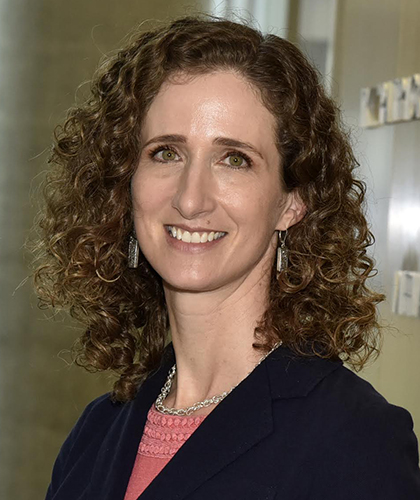
Clyne, Alisa Morss
Fischell Fellow
ADVANCE Professor
Brain and Behavior Institute
Robert E. Fischell Institute for Biomedical Devices
B.S., Mechanical Engineering, Stanford University
Dr. Clyne's Vascular Kinetics Laboratory conducts research at the interface of engineering, biochemistry, and vascular biology. In their prior work, the group largely focused on how an altered glucose environment (e.g., in diabetes) impaired endothelial cell response to shear stress and cyclic strain. Dr. Clyne and her lab have demonstrated that endothelial cells in high glucose do not respond appropriately to mechanical stimuli. Today, the group focuses primarily on the opposite question: how the mechanical environment affects endothelial cell glucose metabolism. They are integrating mechanobiology and metabolism, with the hope of using metabolic engineering to decrease the burden of cardiovascular disease and cancer. With new collaboration opportunities at the University of Maryland, Dr. Clyne and her lab group plan to extend their cell and animal work into human studies.
- Laminar and disturbed flow effects on endothelial glucose metabolism
- Computational models of endothelial glucose metabolism
- Impaired endothelial mechanosensing in pulmonary arterial hypertension
- Arterial stiffness in spinal cord injury
- Perfusion effects on cancer metabolism
- Vascular glucose transport in traumatic brain injury and Alzheimer’s disease
- Pressure myography-on-a-chip
- Energy Fields to Control Mitochondrial Metabolism
Cholesterol Found to Play Key Role in Protecting the Blood-Brain Barrier
Clyne Lab uncovers how cholesterol helps maintain the brain’s protective barrier.BIOE Students Earn Top Honors for Health Innovation at 2025 Capstone Expo
BIOE and BCE students showcased innovative health tech solutions at the 2025 Capstone Design Expo.Clyne Discusses Gene-Exercise Connection in Alzheimer’s Research on Podcast
Clyne discusses how the APOE4 gene may affect the brain’s response to exercise on a new podcast.Guiding the Future Direction in Modeling the Blood-Brain Barrier for Improved Brain Health
BIOE researchers publish innovative research in blood-brain barrier modeling.Goldberg Appointed Associate Chair of Diversity, Equity, Inclusion, and Belonging in BIOE
This Fall, Senior Lecturer Deborah Goldberg will lead Diversity, Equity, Inclusion, and Belonging in BIOE.Agents of Positive Change: Highlighting Women Maryland Engineers
In celebration of Women's History Month, we highlight some of the important contributions of women engineers within our campus community.24 Teams Present at BIOE Capstone Competition Including First BCE Students
On May 8, 2023, 24 teams presented novel designs at the BIOE Capstone Design Competition.Five BIOE Students & Alumni Named NSF Graduate Research Fellows
The NSF Graduate Research Fellowship Program (GRFP) was established to ensure the vitality and diversity of the scientific and engineering workforce of the United States.Recent Bioengineering Graduate Awarded National Mitchell Scholarship
Neelesh Mupparapu (B.S. bioengineering '22) named one of 12 winners to pursue graduate study in IrelandDo Suddenly Self-Centered Brain Cells Promote Disease?
NSF Award Funds UMD Alzheimer’s Research Into Brain Glucose Metabolism$7.9 Million in NIH Awards Propel UMD Aging Research
New multidisciplinary collaborations take on challenges like Alzheimer’s disease prevention.Celebrating 14 Participants of 2021 BIOE REU Program
The BIOE REU program promotes collaboration between UMD and the FDA, making it unlike any other in the countryMaisel to Investigate Little-Known Organ in the Body
Dr. Katharina Maisel was awarded a $1.8 million NIH NIGMS grant to study the interstitium and lymphatics.Maryland Graduate Engineering Ranked #10 Public in the Nation
From extreme batteries to windows made from wood, Clark School’s trendsetting work ranks it among the country’s Top 10 public engineering schools for the 3rd consecutive year.One Size Does Not Fit All
To advance inclusive medical therapies and diversity in fundamental science, one Maryland engineer leads by example.BBI Awards Seed Grants to Six Interdisciplinary Projects
Funded teams feature UMD faculty from 15 academic departments and six centers and institutesClyne Named BIOE Associate Chair, Diversity, Equity & Inclusion
Role will support efforts to enhance diversity within the department and in the STEM fields at large.BIOE Capstone Class Virtually Presents 24 Novel Projects
BIOE seniors present Capstone projects and celebrate winners virtually.Clyne, Jewell Inducted into AIMBE College of Fellows
BIOE faculty awarded one of the highest professional distinctions accorded to a medical/biological engineer.Clyne, Maisel to Join BIOE Faculty in 2019
Associate, assistant professors bring expertise in endothelial cell biology, mucosal drug delivery.American Society of Mechanical Engineers (ASME)
- American Heart Association
- American Institute for Medical and Biological Engineering
- American Society of Mechanical Engineers